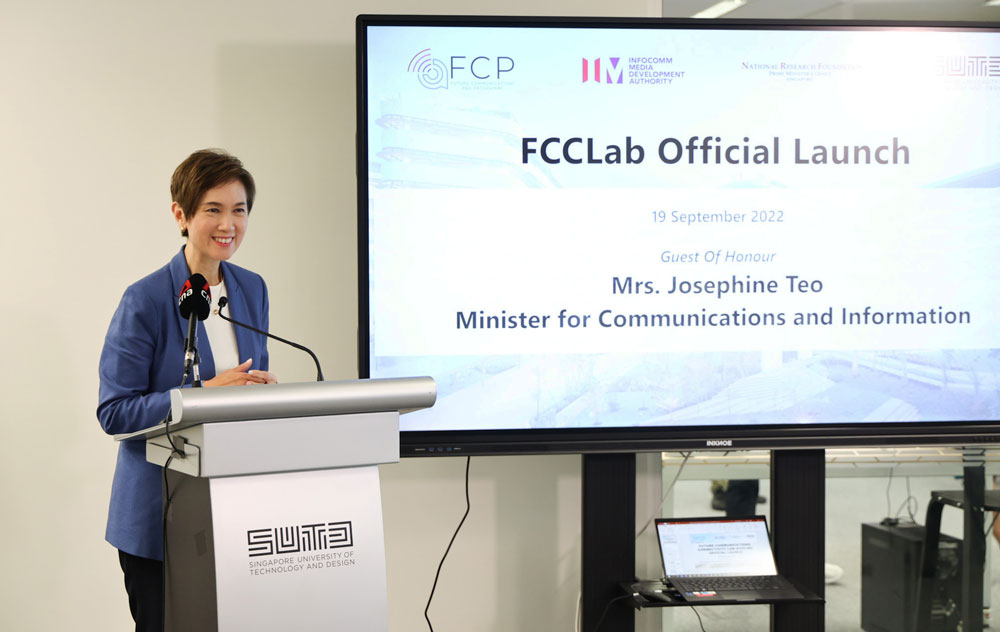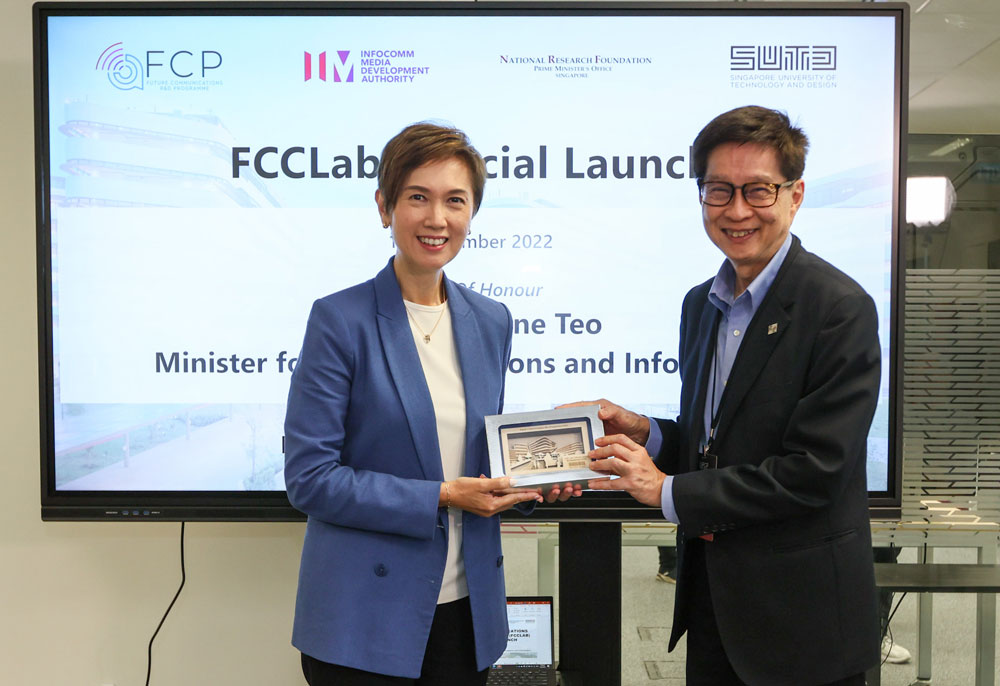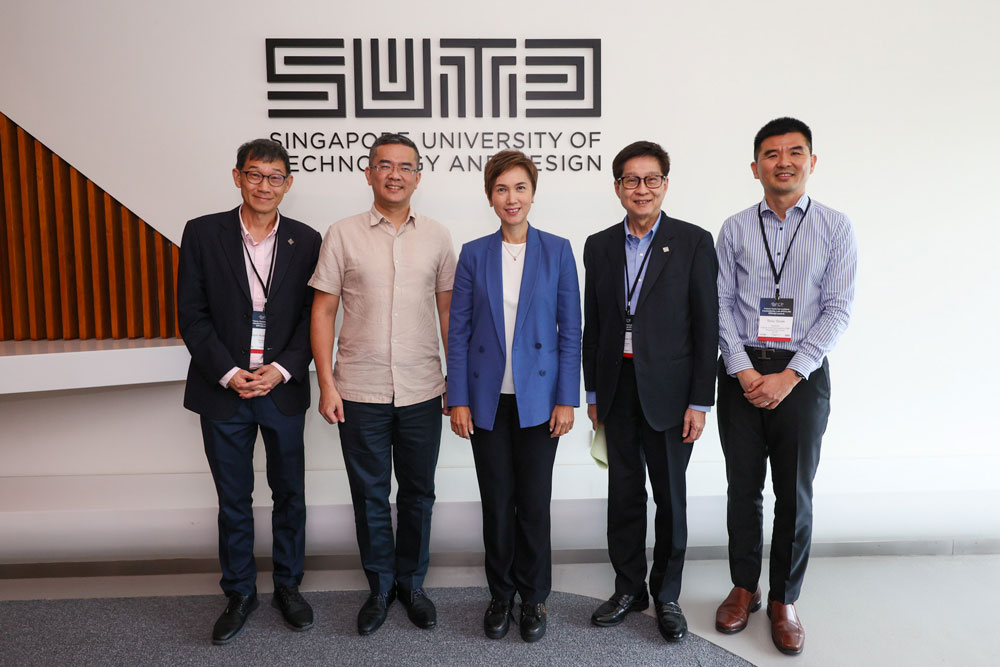Advancing Singapore’s 6G future and talent, IMDA partners SUTD to launch the first 6G R&D lab in Southeast Asia
 Minister for Communications and Information, Mrs Josephine Teo launched SUTD’s Future Communications Connectivity (FCC) Lab.
Minister for Communications and Information, Mrs Josephine Teo launched SUTD’s Future Communications Connectivity (FCC) Lab.
Singapore looks ahead to the next bound and aims to become a global node for 6G Research & Development. The Infocomm Media Development Authority (IMDA) has partnered Singapore University of Technology and Design (SUTD), one of the leading scientific research institutions in telecommunications, to advance Singapore’s future comms and connectivity capabilities and talent.
In preparation for Singapore’s 6G future, Minister for Communications and Information, Mrs Josephine Teo launched SUTD’s Future Communications Connectivity (FCC) Lab, the first physical 6G lab in the region that will also look to combine 6G R&D with SUTD’s AI Mega Centre. FCCLab will accelerate cutting-edge research of future communications technologies and will look to unlock breakthroughs in 6G research and support emerging technologies such as holographic communications and intelligent sensing capabilities to support the next generation of self-driving cars and drones.
Mr Lew Chuen Hong, Chief Executive, IMDA said, “The innovations of today are not possible without constant investment and keeping our eyes on the next bound. We are excited to partner SUTD to launch Southeast Asia’s first 6G Lab. This is the start of our efforts to tap into the promise of future communications tech and become a global node of excellence.”
SUTD president Professor Chong Tow Chong said, “SUTD is pleased to partner IMDA, to progress the industry’s research and educational institutions for talent development in Singapore’s wireless communications ecosystem. We look forward to accelerating the research translation of future communications technologies.”

Southeast Asia’s First 6G Lab
Situated at the SUTD campus, the FCCLab is part of Singapore’s S$70 million Future Communications Research & Development Programme (FCP). FCP is hosted by SUTD and supported by the National Research Foundation, Singapore (NRF), under its Research, Innovation and Enterprise (RIE) efforts. Also supported by IMDA, the FCP will coordinate multidisciplinary research efforts across the RIE ecosystem, with Research Institutes (RIs), Institutes of Higher Learning (IHLs) and other RIE efforts.
 (Left to right) Prof Phoon Kok Kwang, SUTD Provost; Mr Lew Chuen Hong, Chief Executive of IMDA; Mrs Josephine Teo, Minister for Communications and Information; Prof Chong Tow Chong, SUTD President; Prof Tony Quek, Director for FCP and SUTD Head of Pillar for Information Systems Technology and Design.
(Left to right) Prof Phoon Kok Kwang, SUTD Provost; Mr Lew Chuen Hong, Chief Executive of IMDA; Mrs Josephine Teo, Minister for Communications and Information; Prof Chong Tow Chong, SUTD President; Prof Tony Quek, Director for FCP and SUTD Head of Pillar for Information Systems Technology and Design.
FCCLab Testbed will follow 3rd Generation Partnership Project (3GPP1) and Open RAN Standards to support easy evaluation of research outcomes. Network components can be individually replaced to facilitate targeted research.
FCP Updates
As host institution, SUTD will lead collaborations across the Singapore ecosystem - Agency for Science, Technology and Research (A*STAR), Nanyang Technological University, Singapore (NTU), National University of Singapore (NUS), and Singapore Institute of Technology (SIT).
Currently, 20 FCP grant projects has been awarded by SUTD for both research and translation. The research projects focus in the areas of multi-access edge computing, network orchestration, non-terrestrial networks, and security, while the translation projects are based on use cases with thematic focus on innovative mobility capabilities for air, land and sea applications.
To strengthen the pipeline of Singaporean talent, FCP has also supported 14 Masters-level scholarships for local students to pursue research and translations in future communications technologies.
Internationally, Singapore has already forged 6G partnerships with leading 6G institutions such as Finland’s 6G Flagship, and the Korean Institute of Communications and Information Sciences. Under the FCP programme, SUTD is also working with both local enterprises and MNCs.
1 The 3rd Generation Partnership Project (3GPP) refers to a group of standards organisations which develop protocols for mobile telecommunications.